Law for Business Managers: Gemma's Business Scenario Analysis
VerifiedAdded on 2022/12/29
|11
|3415
|93
Report
AI Summary
This report analyzes a business law case study involving Gemma, the sole director of Clean Machine Limited. It examines her responsibilities under the Companies Act 2006, including acting within her powers, promoting company success, exercising independent judgment, and avoiding conflicts of interest. The report then advises Gemma on the process of dismissing an employee, Charanjit, addressing lawful dismissal procedures, unfair dismissal grounds, and the importance of fair procedures. It references the Employment Rights Act and discusses notice periods. Finally, the report offers guidance on resolving a dispute with Precious Time Limited, considering Gemma's desire for future collaboration. The report provides a comprehensive overview of relevant business law principles and their practical application in the given scenarios.
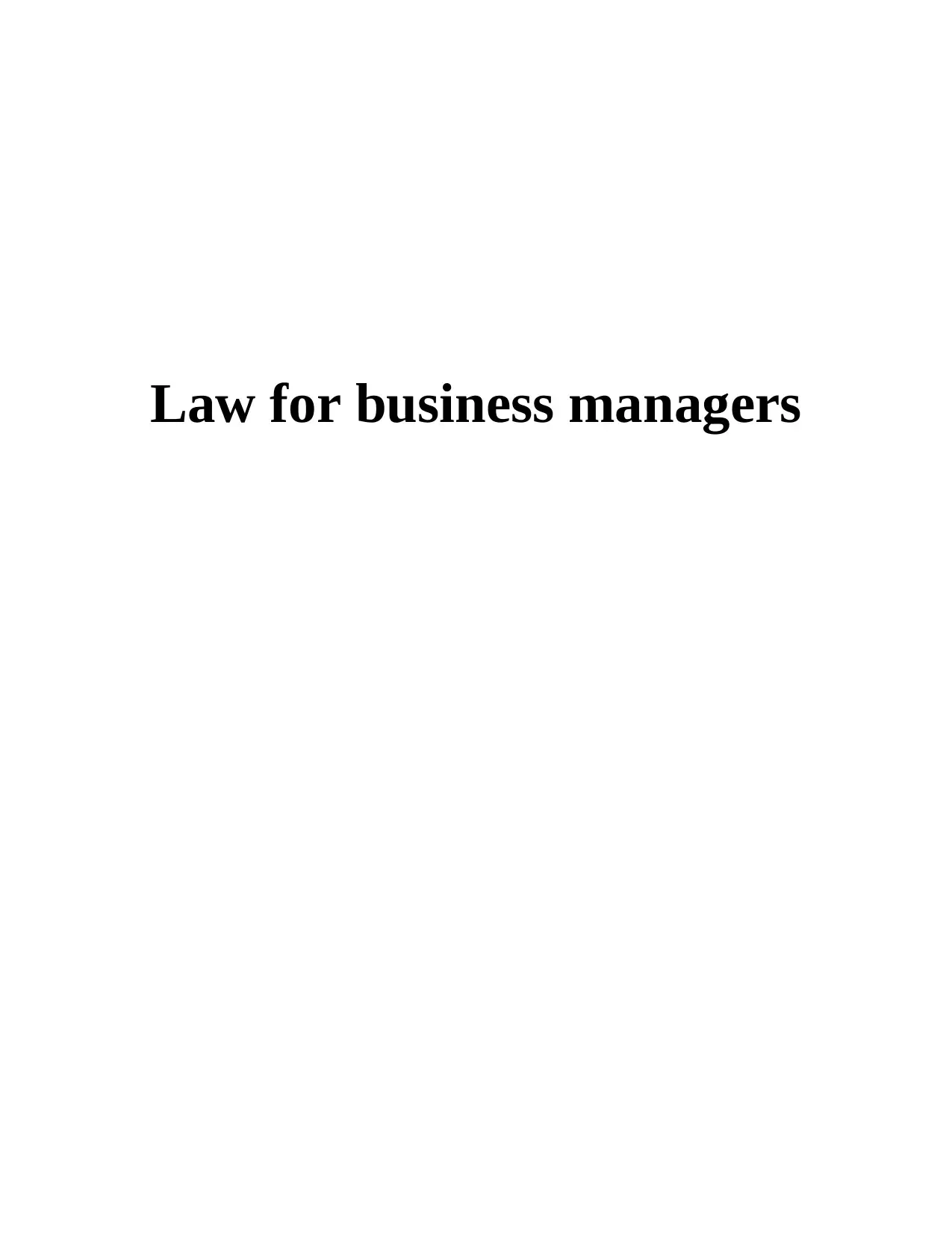
Law for business managers
Paraphrase This Document
Need a fresh take? Get an instant paraphrase of this document with our AI Paraphraser
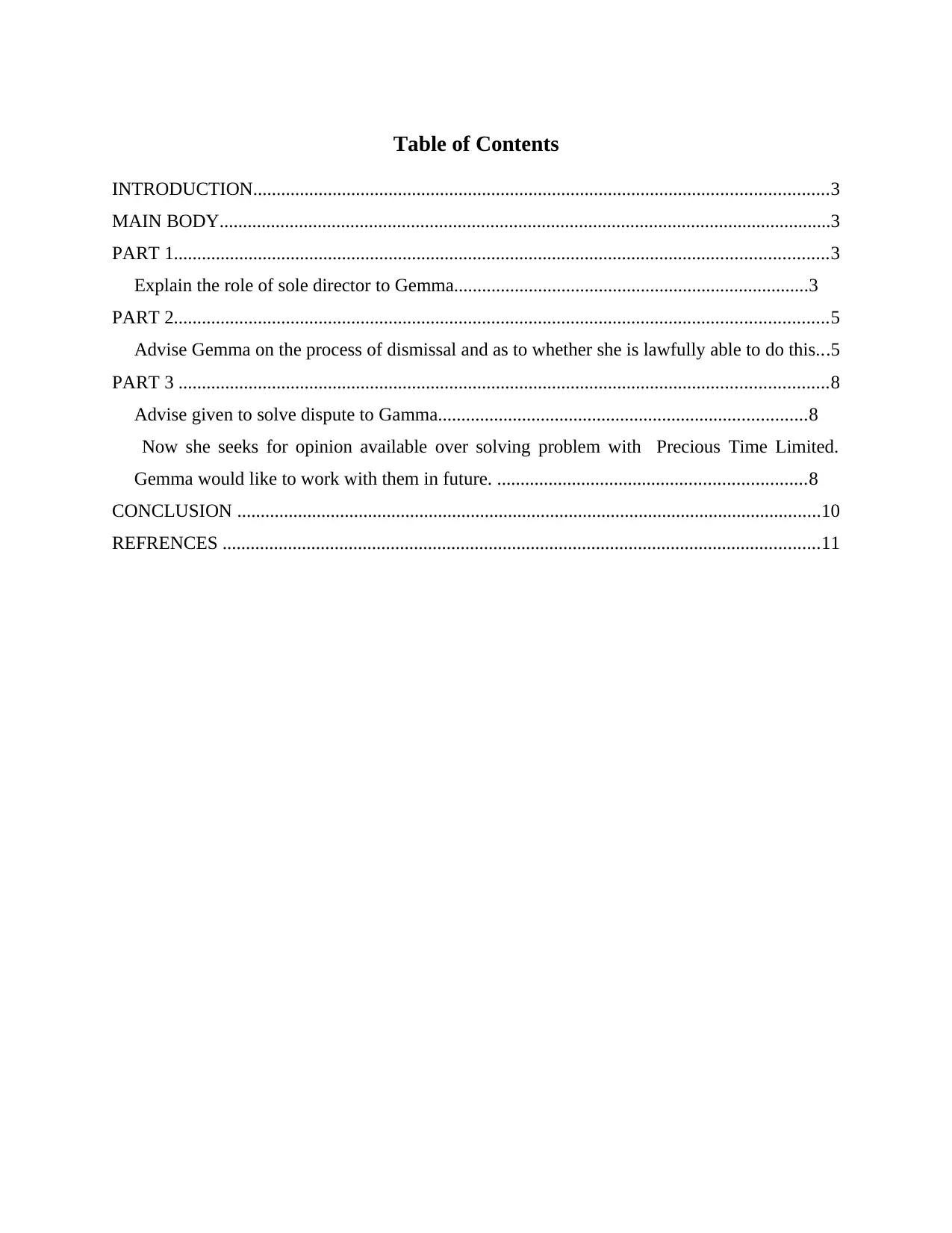
Table of Contents
INTRODUCTION...........................................................................................................................3
MAIN BODY...................................................................................................................................3
PART 1............................................................................................................................................3
Explain the role of sole director to Gemma............................................................................3
PART 2............................................................................................................................................5
Advise Gemma on the process of dismissal and as to whether she is lawfully able to do this...5
PART 3 ...........................................................................................................................................8
Advise given to solve dispute to Gamma...............................................................................8
Now she seeks for opinion available over solving problem with Precious Time Limited.
Gemma would like to work with them in future. ..................................................................8
CONCLUSION .............................................................................................................................10
REFRENCES ................................................................................................................................11
INTRODUCTION...........................................................................................................................3
MAIN BODY...................................................................................................................................3
PART 1............................................................................................................................................3
Explain the role of sole director to Gemma............................................................................3
PART 2............................................................................................................................................5
Advise Gemma on the process of dismissal and as to whether she is lawfully able to do this...5
PART 3 ...........................................................................................................................................8
Advise given to solve dispute to Gamma...............................................................................8
Now she seeks for opinion available over solving problem with Precious Time Limited.
Gemma would like to work with them in future. ..................................................................8
CONCLUSION .............................................................................................................................10
REFRENCES ................................................................................................................................11
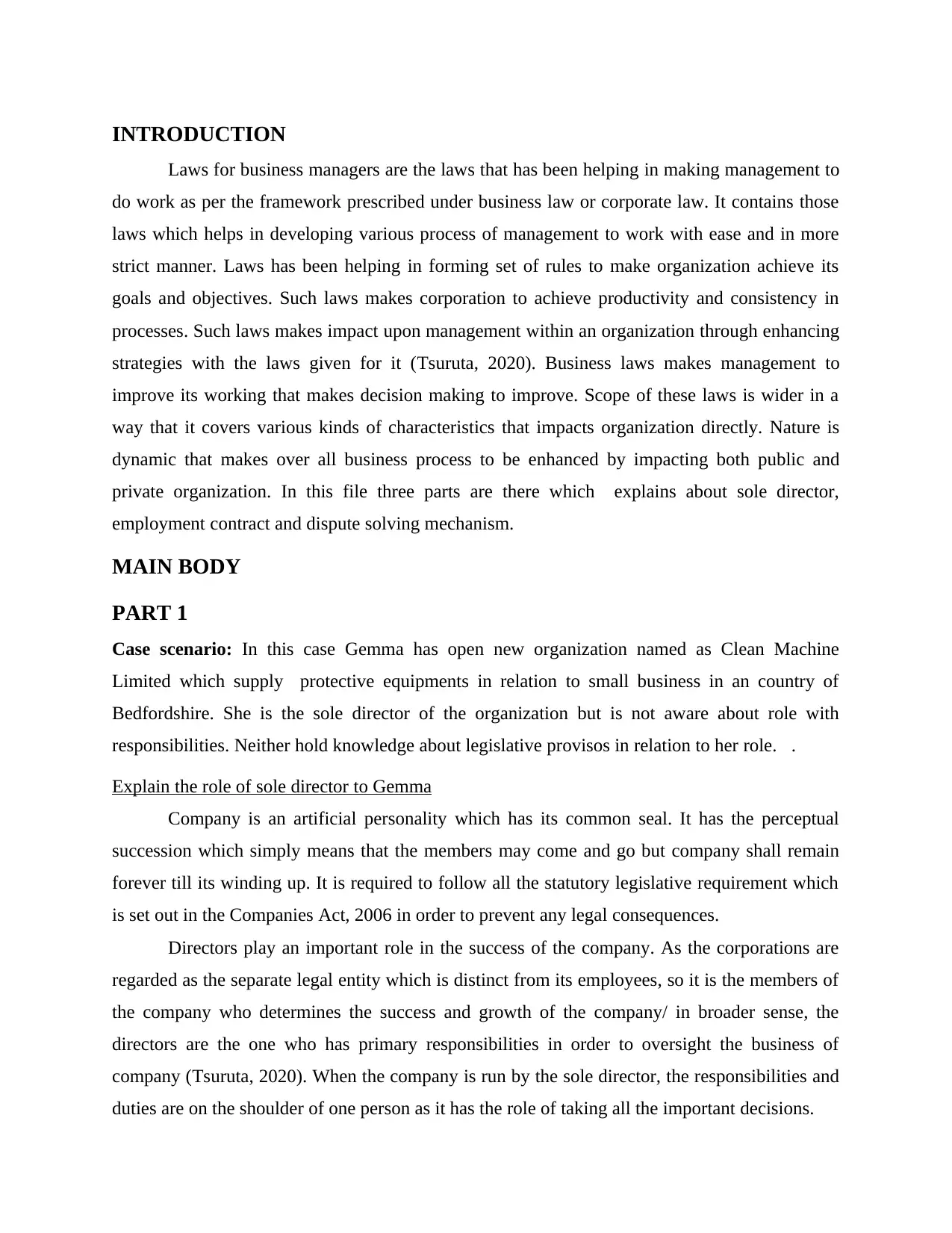
INTRODUCTION
Laws for business managers are the laws that has been helping in making management to
do work as per the framework prescribed under business law or corporate law. It contains those
laws which helps in developing various process of management to work with ease and in more
strict manner. Laws has been helping in forming set of rules to make organization achieve its
goals and objectives. Such laws makes corporation to achieve productivity and consistency in
processes. Such laws makes impact upon management within an organization through enhancing
strategies with the laws given for it (Tsuruta, 2020). Business laws makes management to
improve its working that makes decision making to improve. Scope of these laws is wider in a
way that it covers various kinds of characteristics that impacts organization directly. Nature is
dynamic that makes over all business process to be enhanced by impacting both public and
private organization. In this file three parts are there which explains about sole director,
employment contract and dispute solving mechanism.
MAIN BODY
PART 1
Case scenario: In this case Gemma has open new organization named as Clean Machine
Limited which supply protective equipments in relation to small business in an country of
Bedfordshire. She is the sole director of the organization but is not aware about role with
responsibilities. Neither hold knowledge about legislative provisos in relation to her role. .
Explain the role of sole director to Gemma
Company is an artificial personality which has its common seal. It has the perceptual
succession which simply means that the members may come and go but company shall remain
forever till its winding up. It is required to follow all the statutory legislative requirement which
is set out in the Companies Act, 2006 in order to prevent any legal consequences.
Directors play an important role in the success of the company. As the corporations are
regarded as the separate legal entity which is distinct from its employees, so it is the members of
the company who determines the success and growth of the company/ in broader sense, the
directors are the one who has primary responsibilities in order to oversight the business of
company (Tsuruta, 2020). When the company is run by the sole director, the responsibilities and
duties are on the shoulder of one person as it has the role of taking all the important decisions.
Laws for business managers are the laws that has been helping in making management to
do work as per the framework prescribed under business law or corporate law. It contains those
laws which helps in developing various process of management to work with ease and in more
strict manner. Laws has been helping in forming set of rules to make organization achieve its
goals and objectives. Such laws makes corporation to achieve productivity and consistency in
processes. Such laws makes impact upon management within an organization through enhancing
strategies with the laws given for it (Tsuruta, 2020). Business laws makes management to
improve its working that makes decision making to improve. Scope of these laws is wider in a
way that it covers various kinds of characteristics that impacts organization directly. Nature is
dynamic that makes over all business process to be enhanced by impacting both public and
private organization. In this file three parts are there which explains about sole director,
employment contract and dispute solving mechanism.
MAIN BODY
PART 1
Case scenario: In this case Gemma has open new organization named as Clean Machine
Limited which supply protective equipments in relation to small business in an country of
Bedfordshire. She is the sole director of the organization but is not aware about role with
responsibilities. Neither hold knowledge about legislative provisos in relation to her role. .
Explain the role of sole director to Gemma
Company is an artificial personality which has its common seal. It has the perceptual
succession which simply means that the members may come and go but company shall remain
forever till its winding up. It is required to follow all the statutory legislative requirement which
is set out in the Companies Act, 2006 in order to prevent any legal consequences.
Directors play an important role in the success of the company. As the corporations are
regarded as the separate legal entity which is distinct from its employees, so it is the members of
the company who determines the success and growth of the company/ in broader sense, the
directors are the one who has primary responsibilities in order to oversight the business of
company (Tsuruta, 2020). When the company is run by the sole director, the responsibilities and
duties are on the shoulder of one person as it has the role of taking all the important decisions.
⊘ This is a preview!⊘
Do you want full access?
Subscribe today to unlock all pages.

Trusted by 1+ million students worldwide
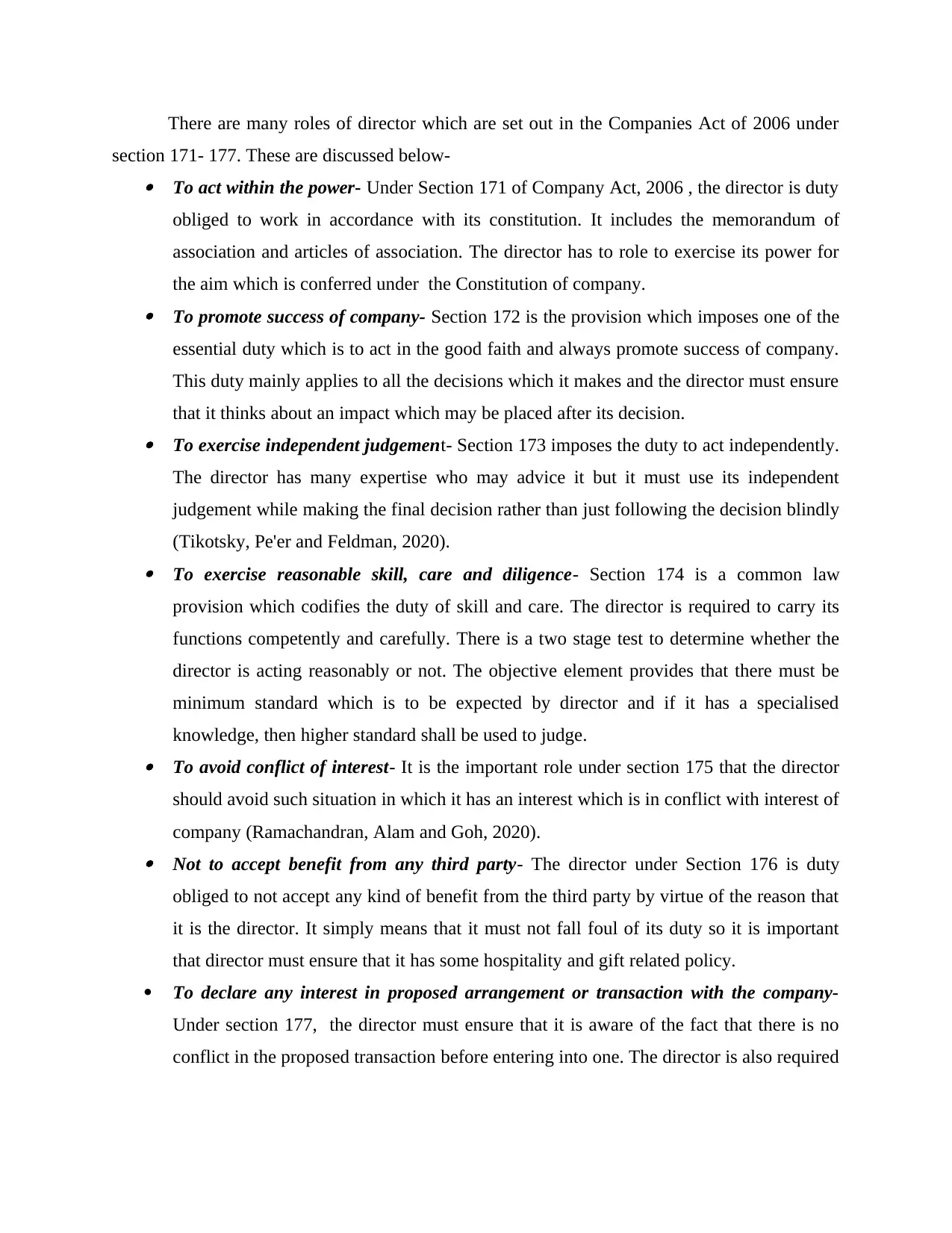
There are many roles of director which are set out in the Companies Act of 2006 under
section 171- 177. These are discussed below- To act within the power- Under Section 171 of Company Act, 2006 , the director is duty
obliged to work in accordance with its constitution. It includes the memorandum of
association and articles of association. The director has to role to exercise its power for
the aim which is conferred under the Constitution of company. To promote success of company- Section 172 is the provision which imposes one of the
essential duty which is to act in the good faith and always promote success of company.
This duty mainly applies to all the decisions which it makes and the director must ensure
that it thinks about an impact which may be placed after its decision. To exercise independent judgement- Section 173 imposes the duty to act independently.
The director has many expertise who may advice it but it must use its independent
judgement while making the final decision rather than just following the decision blindly
(Tikotsky, Pe'er and Feldman, 2020). To exercise reasonable skill, care and diligence- Section 174 is a common law
provision which codifies the duty of skill and care. The director is required to carry its
functions competently and carefully. There is a two stage test to determine whether the
director is acting reasonably or not. The objective element provides that there must be
minimum standard which is to be expected by director and if it has a specialised
knowledge, then higher standard shall be used to judge. To avoid conflict of interest- It is the important role under section 175 that the director
should avoid such situation in which it has an interest which is in conflict with interest of
company (Ramachandran, Alam and Goh, 2020). Not to accept benefit from any third party- The director under Section 176 is duty
obliged to not accept any kind of benefit from the third party by virtue of the reason that
it is the director. It simply means that it must not fall foul of its duty so it is important
that director must ensure that it has some hospitality and gift related policy.
To declare any interest in proposed arrangement or transaction with the company-
Under section 177, the director must ensure that it is aware of the fact that there is no
conflict in the proposed transaction before entering into one. The director is also required
section 171- 177. These are discussed below- To act within the power- Under Section 171 of Company Act, 2006 , the director is duty
obliged to work in accordance with its constitution. It includes the memorandum of
association and articles of association. The director has to role to exercise its power for
the aim which is conferred under the Constitution of company. To promote success of company- Section 172 is the provision which imposes one of the
essential duty which is to act in the good faith and always promote success of company.
This duty mainly applies to all the decisions which it makes and the director must ensure
that it thinks about an impact which may be placed after its decision. To exercise independent judgement- Section 173 imposes the duty to act independently.
The director has many expertise who may advice it but it must use its independent
judgement while making the final decision rather than just following the decision blindly
(Tikotsky, Pe'er and Feldman, 2020). To exercise reasonable skill, care and diligence- Section 174 is a common law
provision which codifies the duty of skill and care. The director is required to carry its
functions competently and carefully. There is a two stage test to determine whether the
director is acting reasonably or not. The objective element provides that there must be
minimum standard which is to be expected by director and if it has a specialised
knowledge, then higher standard shall be used to judge. To avoid conflict of interest- It is the important role under section 175 that the director
should avoid such situation in which it has an interest which is in conflict with interest of
company (Ramachandran, Alam and Goh, 2020). Not to accept benefit from any third party- The director under Section 176 is duty
obliged to not accept any kind of benefit from the third party by virtue of the reason that
it is the director. It simply means that it must not fall foul of its duty so it is important
that director must ensure that it has some hospitality and gift related policy.
To declare any interest in proposed arrangement or transaction with the company-
Under section 177, the director must ensure that it is aware of the fact that there is no
conflict in the proposed transaction before entering into one. The director is also required
Paraphrase This Document
Need a fresh take? Get an instant paraphrase of this document with our AI Paraphraser
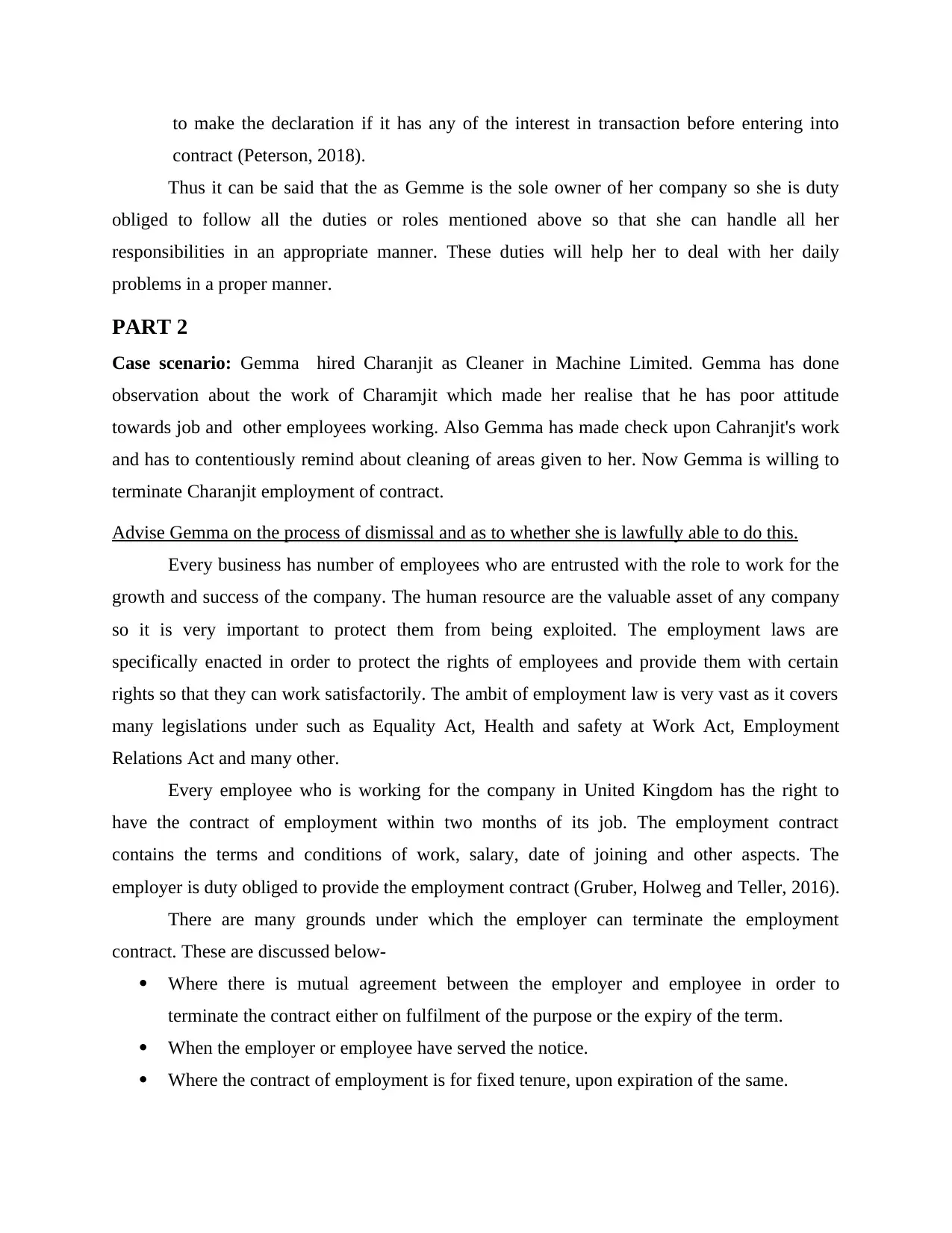
to make the declaration if it has any of the interest in transaction before entering into
contract (Peterson, 2018).
Thus it can be said that the as Gemme is the sole owner of her company so she is duty
obliged to follow all the duties or roles mentioned above so that she can handle all her
responsibilities in an appropriate manner. These duties will help her to deal with her daily
problems in a proper manner.
PART 2
Case scenario: Gemma hired Charanjit as Cleaner in Machine Limited. Gemma has done
observation about the work of Charamjit which made her realise that he has poor attitude
towards job and other employees working. Also Gemma has made check upon Cahranjit's work
and has to contentiously remind about cleaning of areas given to her. Now Gemma is willing to
terminate Charanjit employment of contract.
Advise Gemma on the process of dismissal and as to whether she is lawfully able to do this.
Every business has number of employees who are entrusted with the role to work for the
growth and success of the company. The human resource are the valuable asset of any company
so it is very important to protect them from being exploited. The employment laws are
specifically enacted in order to protect the rights of employees and provide them with certain
rights so that they can work satisfactorily. The ambit of employment law is very vast as it covers
many legislations under such as Equality Act, Health and safety at Work Act, Employment
Relations Act and many other.
Every employee who is working for the company in United Kingdom has the right to
have the contract of employment within two months of its job. The employment contract
contains the terms and conditions of work, salary, date of joining and other aspects. The
employer is duty obliged to provide the employment contract (Gruber, Holweg and Teller, 2016).
There are many grounds under which the employer can terminate the employment
contract. These are discussed below-
Where there is mutual agreement between the employer and employee in order to
terminate the contract either on fulfilment of the purpose or the expiry of the term.
When the employer or employee have served the notice.
Where the contract of employment is for fixed tenure, upon expiration of the same.
contract (Peterson, 2018).
Thus it can be said that the as Gemme is the sole owner of her company so she is duty
obliged to follow all the duties or roles mentioned above so that she can handle all her
responsibilities in an appropriate manner. These duties will help her to deal with her daily
problems in a proper manner.
PART 2
Case scenario: Gemma hired Charanjit as Cleaner in Machine Limited. Gemma has done
observation about the work of Charamjit which made her realise that he has poor attitude
towards job and other employees working. Also Gemma has made check upon Cahranjit's work
and has to contentiously remind about cleaning of areas given to her. Now Gemma is willing to
terminate Charanjit employment of contract.
Advise Gemma on the process of dismissal and as to whether she is lawfully able to do this.
Every business has number of employees who are entrusted with the role to work for the
growth and success of the company. The human resource are the valuable asset of any company
so it is very important to protect them from being exploited. The employment laws are
specifically enacted in order to protect the rights of employees and provide them with certain
rights so that they can work satisfactorily. The ambit of employment law is very vast as it covers
many legislations under such as Equality Act, Health and safety at Work Act, Employment
Relations Act and many other.
Every employee who is working for the company in United Kingdom has the right to
have the contract of employment within two months of its job. The employment contract
contains the terms and conditions of work, salary, date of joining and other aspects. The
employer is duty obliged to provide the employment contract (Gruber, Holweg and Teller, 2016).
There are many grounds under which the employer can terminate the employment
contract. These are discussed below-
Where there is mutual agreement between the employer and employee in order to
terminate the contract either on fulfilment of the purpose or the expiry of the term.
When the employer or employee have served the notice.
Where the contract of employment is for fixed tenure, upon expiration of the same.
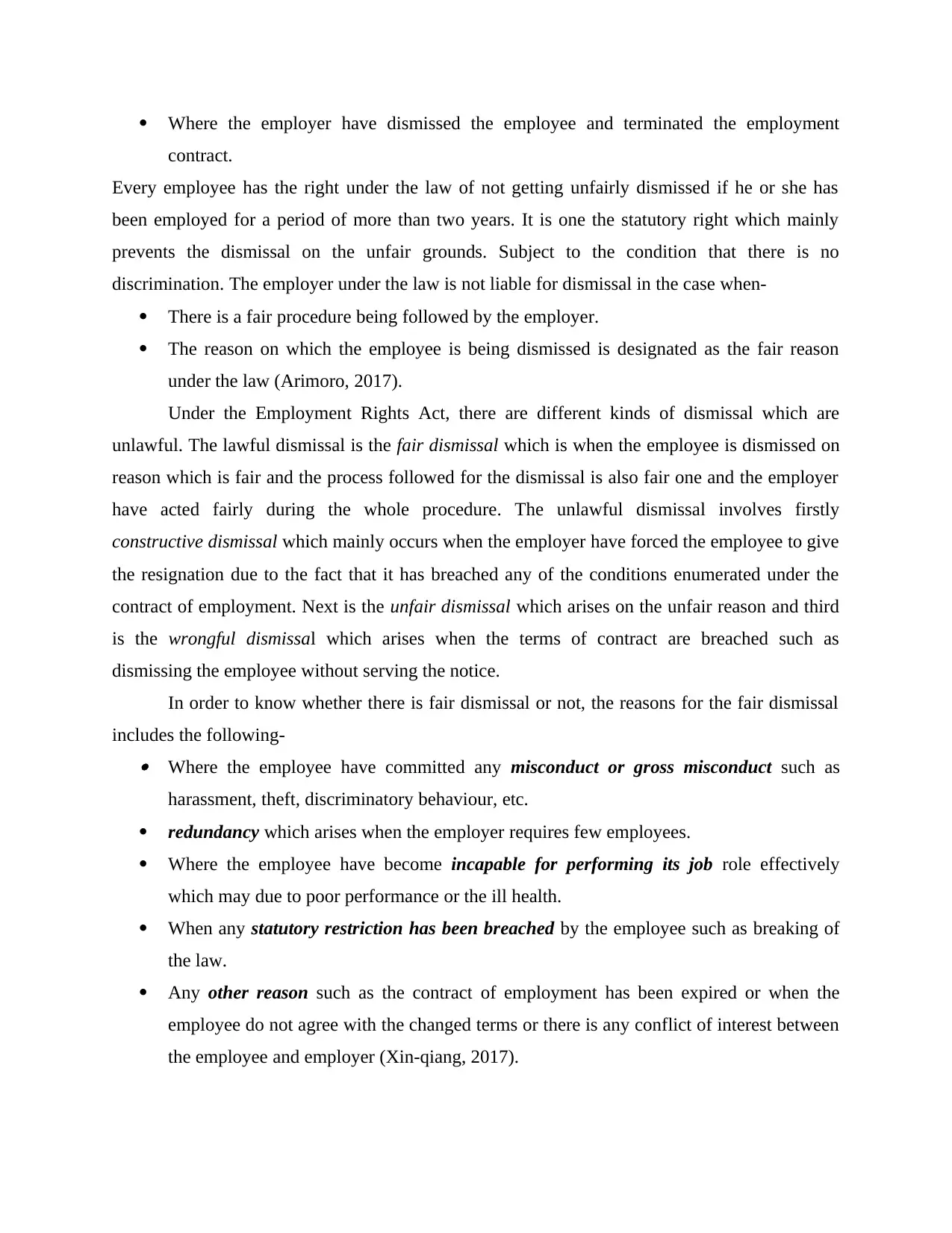
Where the employer have dismissed the employee and terminated the employment
contract.
Every employee has the right under the law of not getting unfairly dismissed if he or she has
been employed for a period of more than two years. It is one the statutory right which mainly
prevents the dismissal on the unfair grounds. Subject to the condition that there is no
discrimination. The employer under the law is not liable for dismissal in the case when-
There is a fair procedure being followed by the employer.
The reason on which the employee is being dismissed is designated as the fair reason
under the law (Arimoro, 2017).
Under the Employment Rights Act, there are different kinds of dismissal which are
unlawful. The lawful dismissal is the fair dismissal which is when the employee is dismissed on
reason which is fair and the process followed for the dismissal is also fair one and the employer
have acted fairly during the whole procedure. The unlawful dismissal involves firstly
constructive dismissal which mainly occurs when the employer have forced the employee to give
the resignation due to the fact that it has breached any of the conditions enumerated under the
contract of employment. Next is the unfair dismissal which arises on the unfair reason and third
is the wrongful dismissal which arises when the terms of contract are breached such as
dismissing the employee without serving the notice.
In order to know whether there is fair dismissal or not, the reasons for the fair dismissal
includes the following- Where the employee have committed any misconduct or gross misconduct such as
harassment, theft, discriminatory behaviour, etc.
redundancy which arises when the employer requires few employees.
Where the employee have become incapable for performing its job role effectively
which may due to poor performance or the ill health.
When any statutory restriction has been breached by the employee such as breaking of
the law.
Any other reason such as the contract of employment has been expired or when the
employee do not agree with the changed terms or there is any conflict of interest between
the employee and employer (Xin-qiang, 2017).
contract.
Every employee has the right under the law of not getting unfairly dismissed if he or she has
been employed for a period of more than two years. It is one the statutory right which mainly
prevents the dismissal on the unfair grounds. Subject to the condition that there is no
discrimination. The employer under the law is not liable for dismissal in the case when-
There is a fair procedure being followed by the employer.
The reason on which the employee is being dismissed is designated as the fair reason
under the law (Arimoro, 2017).
Under the Employment Rights Act, there are different kinds of dismissal which are
unlawful. The lawful dismissal is the fair dismissal which is when the employee is dismissed on
reason which is fair and the process followed for the dismissal is also fair one and the employer
have acted fairly during the whole procedure. The unlawful dismissal involves firstly
constructive dismissal which mainly occurs when the employer have forced the employee to give
the resignation due to the fact that it has breached any of the conditions enumerated under the
contract of employment. Next is the unfair dismissal which arises on the unfair reason and third
is the wrongful dismissal which arises when the terms of contract are breached such as
dismissing the employee without serving the notice.
In order to know whether there is fair dismissal or not, the reasons for the fair dismissal
includes the following- Where the employee have committed any misconduct or gross misconduct such as
harassment, theft, discriminatory behaviour, etc.
redundancy which arises when the employer requires few employees.
Where the employee have become incapable for performing its job role effectively
which may due to poor performance or the ill health.
When any statutory restriction has been breached by the employee such as breaking of
the law.
Any other reason such as the contract of employment has been expired or when the
employee do not agree with the changed terms or there is any conflict of interest between
the employee and employer (Xin-qiang, 2017).
⊘ This is a preview!⊘
Do you want full access?
Subscribe today to unlock all pages.

Trusted by 1+ million students worldwide
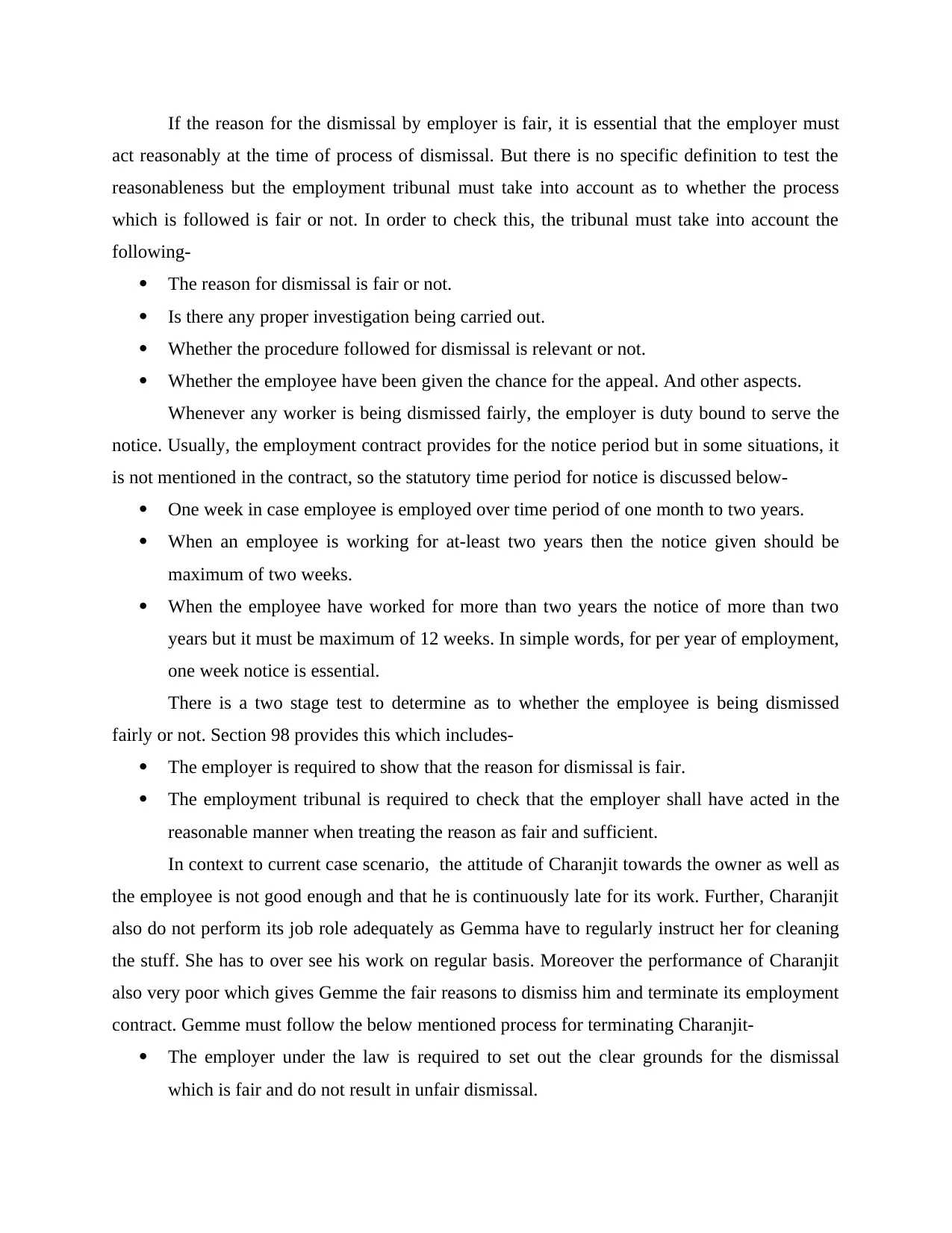
If the reason for the dismissal by employer is fair, it is essential that the employer must
act reasonably at the time of process of dismissal. But there is no specific definition to test the
reasonableness but the employment tribunal must take into account as to whether the process
which is followed is fair or not. In order to check this, the tribunal must take into account the
following-
The reason for dismissal is fair or not.
Is there any proper investigation being carried out.
Whether the procedure followed for dismissal is relevant or not.
Whether the employee have been given the chance for the appeal. And other aspects.
Whenever any worker is being dismissed fairly, the employer is duty bound to serve the
notice. Usually, the employment contract provides for the notice period but in some situations, it
is not mentioned in the contract, so the statutory time period for notice is discussed below-
One week in case employee is employed over time period of one month to two years.
When an employee is working for at-least two years then the notice given should be
maximum of two weeks.
When the employee have worked for more than two years the notice of more than two
years but it must be maximum of 12 weeks. In simple words, for per year of employment,
one week notice is essential.
There is a two stage test to determine as to whether the employee is being dismissed
fairly or not. Section 98 provides this which includes-
The employer is required to show that the reason for dismissal is fair.
The employment tribunal is required to check that the employer shall have acted in the
reasonable manner when treating the reason as fair and sufficient.
In context to current case scenario, the attitude of Charanjit towards the owner as well as
the employee is not good enough and that he is continuously late for its work. Further, Charanjit
also do not perform its job role adequately as Gemma have to regularly instruct her for cleaning
the stuff. She has to over see his work on regular basis. Moreover the performance of Charanjit
also very poor which gives Gemme the fair reasons to dismiss him and terminate its employment
contract. Gemme must follow the below mentioned process for terminating Charanjit-
The employer under the law is required to set out the clear grounds for the dismissal
which is fair and do not result in unfair dismissal.
act reasonably at the time of process of dismissal. But there is no specific definition to test the
reasonableness but the employment tribunal must take into account as to whether the process
which is followed is fair or not. In order to check this, the tribunal must take into account the
following-
The reason for dismissal is fair or not.
Is there any proper investigation being carried out.
Whether the procedure followed for dismissal is relevant or not.
Whether the employee have been given the chance for the appeal. And other aspects.
Whenever any worker is being dismissed fairly, the employer is duty bound to serve the
notice. Usually, the employment contract provides for the notice period but in some situations, it
is not mentioned in the contract, so the statutory time period for notice is discussed below-
One week in case employee is employed over time period of one month to two years.
When an employee is working for at-least two years then the notice given should be
maximum of two weeks.
When the employee have worked for more than two years the notice of more than two
years but it must be maximum of 12 weeks. In simple words, for per year of employment,
one week notice is essential.
There is a two stage test to determine as to whether the employee is being dismissed
fairly or not. Section 98 provides this which includes-
The employer is required to show that the reason for dismissal is fair.
The employment tribunal is required to check that the employer shall have acted in the
reasonable manner when treating the reason as fair and sufficient.
In context to current case scenario, the attitude of Charanjit towards the owner as well as
the employee is not good enough and that he is continuously late for its work. Further, Charanjit
also do not perform its job role adequately as Gemma have to regularly instruct her for cleaning
the stuff. She has to over see his work on regular basis. Moreover the performance of Charanjit
also very poor which gives Gemme the fair reasons to dismiss him and terminate its employment
contract. Gemme must follow the below mentioned process for terminating Charanjit-
The employer under the law is required to set out the clear grounds for the dismissal
which is fair and do not result in unfair dismissal.
Paraphrase This Document
Need a fresh take? Get an instant paraphrase of this document with our AI Paraphraser
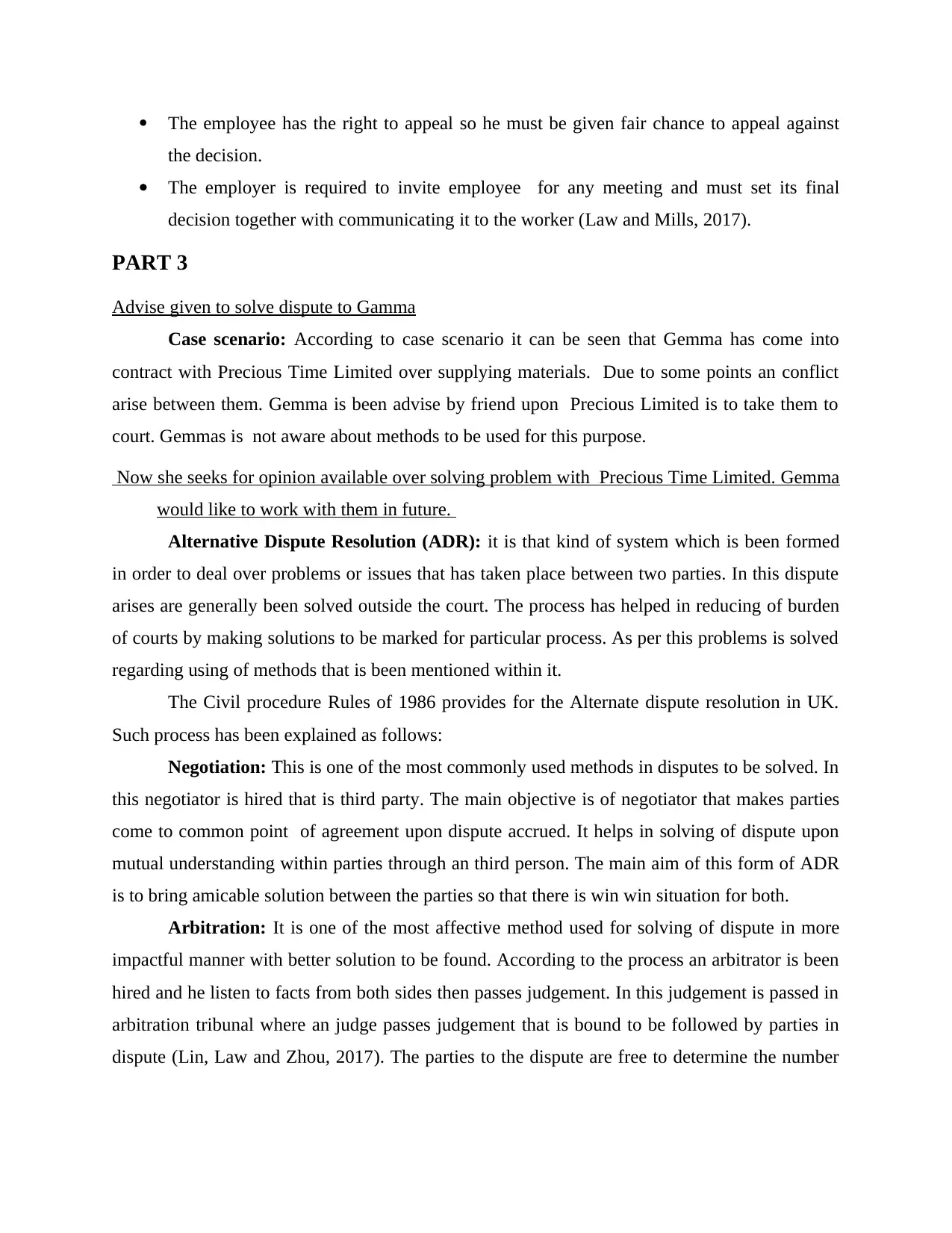
The employee has the right to appeal so he must be given fair chance to appeal against
the decision.
The employer is required to invite employee for any meeting and must set its final
decision together with communicating it to the worker (Law and Mills, 2017).
PART 3
Advise given to solve dispute to Gamma
Case scenario: According to case scenario it can be seen that Gemma has come into
contract with Precious Time Limited over supplying materials. Due to some points an conflict
arise between them. Gemma is been advise by friend upon Precious Limited is to take them to
court. Gemmas is not aware about methods to be used for this purpose.
Now she seeks for opinion available over solving problem with Precious Time Limited. Gemma
would like to work with them in future.
Alternative Dispute Resolution (ADR): it is that kind of system which is been formed
in order to deal over problems or issues that has taken place between two parties. In this dispute
arises are generally been solved outside the court. The process has helped in reducing of burden
of courts by making solutions to be marked for particular process. As per this problems is solved
regarding using of methods that is been mentioned within it.
The Civil procedure Rules of 1986 provides for the Alternate dispute resolution in UK.
Such process has been explained as follows:
Negotiation: This is one of the most commonly used methods in disputes to be solved. In
this negotiator is hired that is third party. The main objective is of negotiator that makes parties
come to common point of agreement upon dispute accrued. It helps in solving of dispute upon
mutual understanding within parties through an third person. The main aim of this form of ADR
is to bring amicable solution between the parties so that there is win win situation for both.
Arbitration: It is one of the most affective method used for solving of dispute in more
impactful manner with better solution to be found. According to the process an arbitrator is been
hired and he listen to facts from both sides then passes judgement. In this judgement is passed in
arbitration tribunal where an judge passes judgement that is bound to be followed by parties in
dispute (Lin, Law and Zhou, 2017). The parties to the dispute are free to determine the number
the decision.
The employer is required to invite employee for any meeting and must set its final
decision together with communicating it to the worker (Law and Mills, 2017).
PART 3
Advise given to solve dispute to Gamma
Case scenario: According to case scenario it can be seen that Gemma has come into
contract with Precious Time Limited over supplying materials. Due to some points an conflict
arise between them. Gemma is been advise by friend upon Precious Limited is to take them to
court. Gemmas is not aware about methods to be used for this purpose.
Now she seeks for opinion available over solving problem with Precious Time Limited. Gemma
would like to work with them in future.
Alternative Dispute Resolution (ADR): it is that kind of system which is been formed
in order to deal over problems or issues that has taken place between two parties. In this dispute
arises are generally been solved outside the court. The process has helped in reducing of burden
of courts by making solutions to be marked for particular process. As per this problems is solved
regarding using of methods that is been mentioned within it.
The Civil procedure Rules of 1986 provides for the Alternate dispute resolution in UK.
Such process has been explained as follows:
Negotiation: This is one of the most commonly used methods in disputes to be solved. In
this negotiator is hired that is third party. The main objective is of negotiator that makes parties
come to common point of agreement upon dispute accrued. It helps in solving of dispute upon
mutual understanding within parties through an third person. The main aim of this form of ADR
is to bring amicable solution between the parties so that there is win win situation for both.
Arbitration: It is one of the most affective method used for solving of dispute in more
impactful manner with better solution to be found. According to the process an arbitrator is been
hired and he listen to facts from both sides then passes judgement. In this judgement is passed in
arbitration tribunal where an judge passes judgement that is bound to be followed by parties in
dispute (Lin, Law and Zhou, 2017). The parties to the dispute are free to determine the number
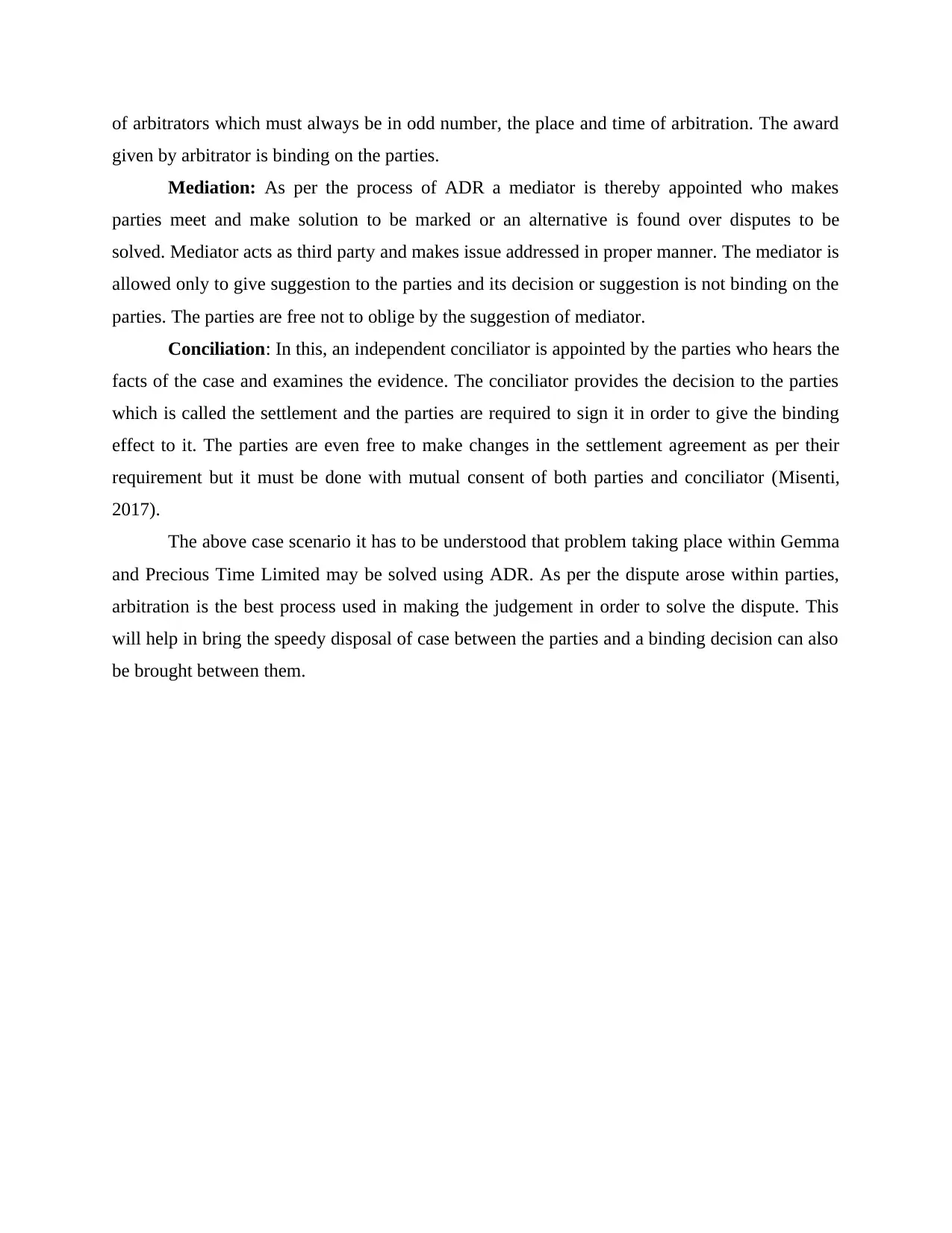
of arbitrators which must always be in odd number, the place and time of arbitration. The award
given by arbitrator is binding on the parties.
Mediation: As per the process of ADR a mediator is thereby appointed who makes
parties meet and make solution to be marked or an alternative is found over disputes to be
solved. Mediator acts as third party and makes issue addressed in proper manner. The mediator is
allowed only to give suggestion to the parties and its decision or suggestion is not binding on the
parties. The parties are free not to oblige by the suggestion of mediator.
Conciliation: In this, an independent conciliator is appointed by the parties who hears the
facts of the case and examines the evidence. The conciliator provides the decision to the parties
which is called the settlement and the parties are required to sign it in order to give the binding
effect to it. The parties are even free to make changes in the settlement agreement as per their
requirement but it must be done with mutual consent of both parties and conciliator (Misenti,
2017).
The above case scenario it has to be understood that problem taking place within Gemma
and Precious Time Limited may be solved using ADR. As per the dispute arose within parties,
arbitration is the best process used in making the judgement in order to solve the dispute. This
will help in bring the speedy disposal of case between the parties and a binding decision can also
be brought between them.
given by arbitrator is binding on the parties.
Mediation: As per the process of ADR a mediator is thereby appointed who makes
parties meet and make solution to be marked or an alternative is found over disputes to be
solved. Mediator acts as third party and makes issue addressed in proper manner. The mediator is
allowed only to give suggestion to the parties and its decision or suggestion is not binding on the
parties. The parties are free not to oblige by the suggestion of mediator.
Conciliation: In this, an independent conciliator is appointed by the parties who hears the
facts of the case and examines the evidence. The conciliator provides the decision to the parties
which is called the settlement and the parties are required to sign it in order to give the binding
effect to it. The parties are even free to make changes in the settlement agreement as per their
requirement but it must be done with mutual consent of both parties and conciliator (Misenti,
2017).
The above case scenario it has to be understood that problem taking place within Gemma
and Precious Time Limited may be solved using ADR. As per the dispute arose within parties,
arbitration is the best process used in making the judgement in order to solve the dispute. This
will help in bring the speedy disposal of case between the parties and a binding decision can also
be brought between them.
⊘ This is a preview!⊘
Do you want full access?
Subscribe today to unlock all pages.

Trusted by 1+ million students worldwide
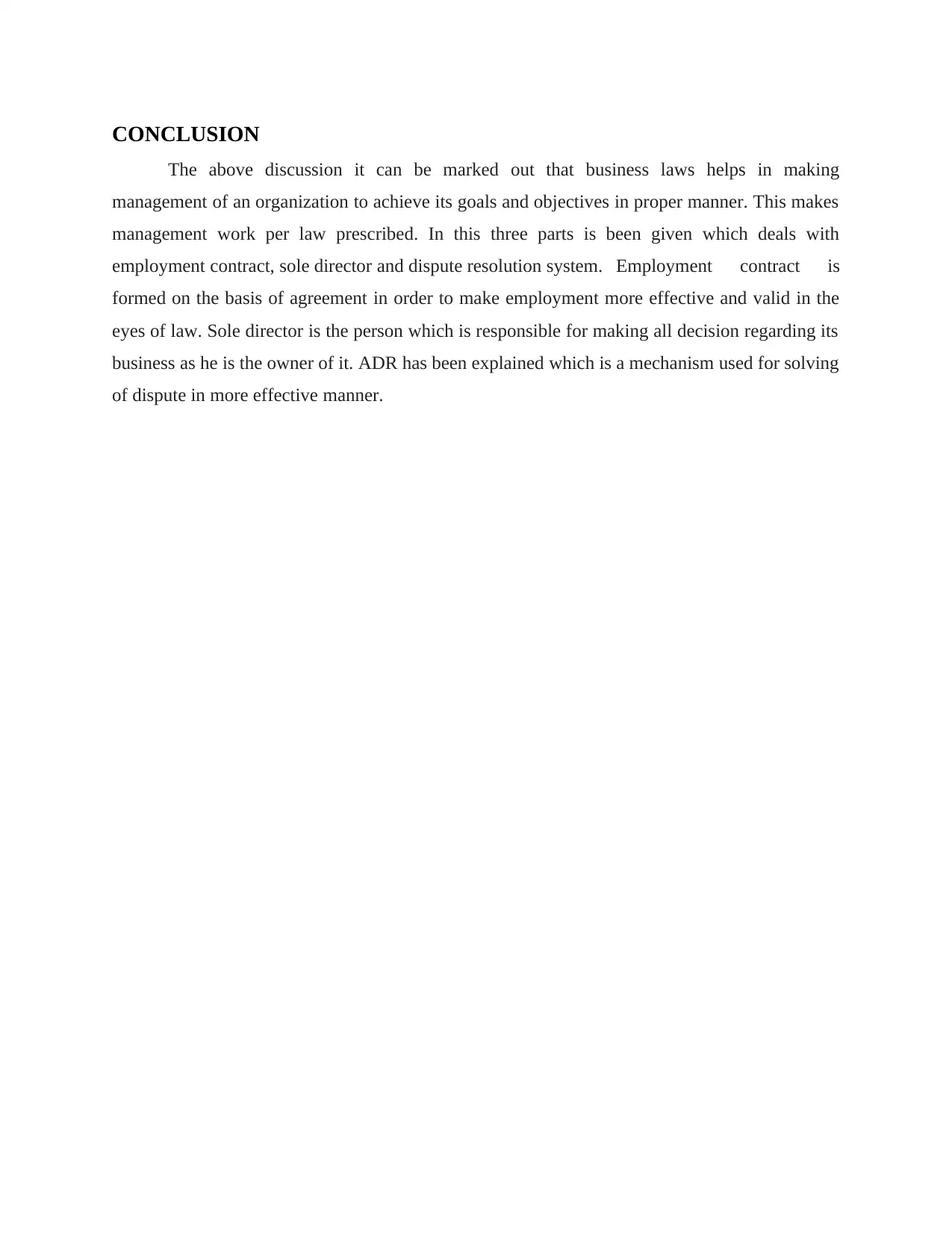
CONCLUSION
The above discussion it can be marked out that business laws helps in making
management of an organization to achieve its goals and objectives in proper manner. This makes
management work per law prescribed. In this three parts is been given which deals with
employment contract, sole director and dispute resolution system. Employment contract is
formed on the basis of agreement in order to make employment more effective and valid in the
eyes of law. Sole director is the person which is responsible for making all decision regarding its
business as he is the owner of it. ADR has been explained which is a mechanism used for solving
of dispute in more effective manner.
The above discussion it can be marked out that business laws helps in making
management of an organization to achieve its goals and objectives in proper manner. This makes
management work per law prescribed. In this three parts is been given which deals with
employment contract, sole director and dispute resolution system. Employment contract is
formed on the basis of agreement in order to make employment more effective and valid in the
eyes of law. Sole director is the person which is responsible for making all decision regarding its
business as he is the owner of it. ADR has been explained which is a mechanism used for solving
of dispute in more effective manner.
Paraphrase This Document
Need a fresh take? Get an instant paraphrase of this document with our AI Paraphraser
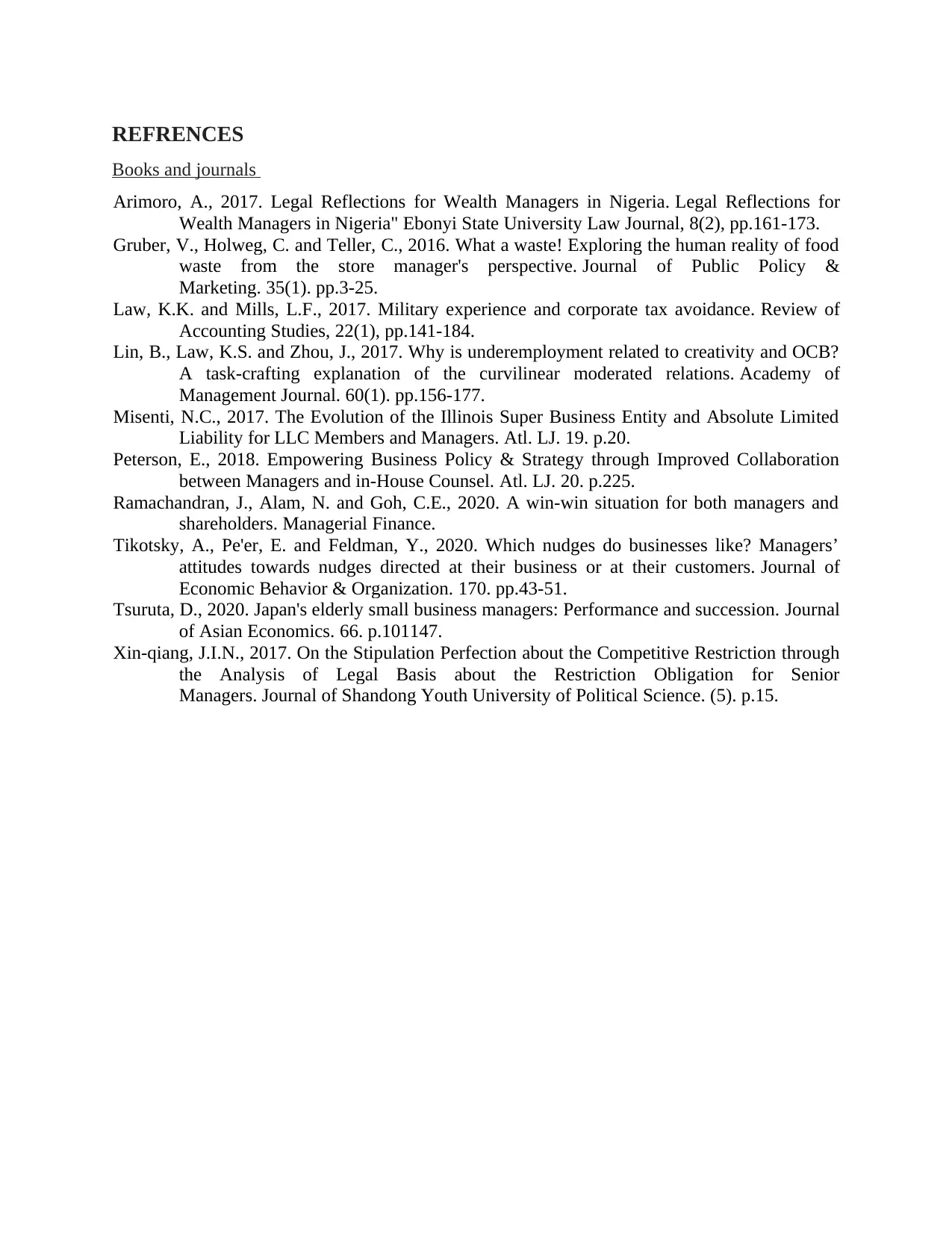
REFRENCES
Books and journals
Arimoro, A., 2017. Legal Reflections for Wealth Managers in Nigeria. Legal Reflections for
Wealth Managers in Nigeria" Ebonyi State University Law Journal, 8(2), pp.161-173.
Gruber, V., Holweg, C. and Teller, C., 2016. What a waste! Exploring the human reality of food
waste from the store manager's perspective. Journal of Public Policy &
Marketing. 35(1). pp.3-25.
Law, K.K. and Mills, L.F., 2017. Military experience and corporate tax avoidance. Review of
Accounting Studies, 22(1), pp.141-184.
Lin, B., Law, K.S. and Zhou, J., 2017. Why is underemployment related to creativity and OCB?
A task-crafting explanation of the curvilinear moderated relations. Academy of
Management Journal. 60(1). pp.156-177.
Misenti, N.C., 2017. The Evolution of the Illinois Super Business Entity and Absolute Limited
Liability for LLC Members and Managers. Atl. LJ. 19. p.20.
Peterson, E., 2018. Empowering Business Policy & Strategy through Improved Collaboration
between Managers and in-House Counsel. Atl. LJ. 20. p.225.
Ramachandran, J., Alam, N. and Goh, C.E., 2020. A win-win situation for both managers and
shareholders. Managerial Finance.
Tikotsky, A., Pe'er, E. and Feldman, Y., 2020. Which nudges do businesses like? Managers’
attitudes towards nudges directed at their business or at their customers. Journal of
Economic Behavior & Organization. 170. pp.43-51.
Tsuruta, D., 2020. Japan's elderly small business managers: Performance and succession. Journal
of Asian Economics. 66. p.101147.
Xin-qiang, J.I.N., 2017. On the Stipulation Perfection about the Competitive Restriction through
the Analysis of Legal Basis about the Restriction Obligation for Senior
Managers. Journal of Shandong Youth University of Political Science. (5). p.15.
Books and journals
Arimoro, A., 2017. Legal Reflections for Wealth Managers in Nigeria. Legal Reflections for
Wealth Managers in Nigeria" Ebonyi State University Law Journal, 8(2), pp.161-173.
Gruber, V., Holweg, C. and Teller, C., 2016. What a waste! Exploring the human reality of food
waste from the store manager's perspective. Journal of Public Policy &
Marketing. 35(1). pp.3-25.
Law, K.K. and Mills, L.F., 2017. Military experience and corporate tax avoidance. Review of
Accounting Studies, 22(1), pp.141-184.
Lin, B., Law, K.S. and Zhou, J., 2017. Why is underemployment related to creativity and OCB?
A task-crafting explanation of the curvilinear moderated relations. Academy of
Management Journal. 60(1). pp.156-177.
Misenti, N.C., 2017. The Evolution of the Illinois Super Business Entity and Absolute Limited
Liability for LLC Members and Managers. Atl. LJ. 19. p.20.
Peterson, E., 2018. Empowering Business Policy & Strategy through Improved Collaboration
between Managers and in-House Counsel. Atl. LJ. 20. p.225.
Ramachandran, J., Alam, N. and Goh, C.E., 2020. A win-win situation for both managers and
shareholders. Managerial Finance.
Tikotsky, A., Pe'er, E. and Feldman, Y., 2020. Which nudges do businesses like? Managers’
attitudes towards nudges directed at their business or at their customers. Journal of
Economic Behavior & Organization. 170. pp.43-51.
Tsuruta, D., 2020. Japan's elderly small business managers: Performance and succession. Journal
of Asian Economics. 66. p.101147.
Xin-qiang, J.I.N., 2017. On the Stipulation Perfection about the Competitive Restriction through
the Analysis of Legal Basis about the Restriction Obligation for Senior
Managers. Journal of Shandong Youth University of Political Science. (5). p.15.
1 out of 11
Related Documents
Your All-in-One AI-Powered Toolkit for Academic Success.
+13062052269
info@desklib.com
Available 24*7 on WhatsApp / Email
![[object Object]](/_next/static/media/star-bottom.7253800d.svg)
Unlock your academic potential
Copyright © 2020–2026 A2Z Services. All Rights Reserved. Developed and managed by ZUCOL.





